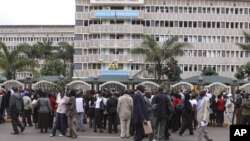NAIROBI, Kenya - The Kenya National Union of Teachers is threatening a nation-wide strike if the Kenyan government does not release funds for primary and secondary school education. The government says the money is on its way to the schools.
The teachers’ union has given the Kenyan government until Friday to release more than $127 million to the education system or face countrywide closures of primary and secondary schools.
Kenya National Union of Teachers Chairman Wilson Sossion says the government has released only nine percent of the funds allocated for secondary schools, while primary schools have received almost 80 percent of their money.
Sossion says the results are devastating.
“The tuition material is fully paid by the government, it is charged against this money. So how do you expect teachers to deliver quality learning without these resources? And the suppliers are withdrawing," said Sossion. "Nobody can supply materials or can supply resources for a long period of time when payment is very uncertain.”
Materials funded by the government include textbooks, exercise books, stationary, and other learning aids, as well as workers’ salaries. Sossion says workers in schools have not been paid since April.
Sossion blames the situation on what he calls “miscommunication” between the Ministry of Education and the Treasury.
He says if the impasse is not resolved by June 8, the union will instruct school personnel to close primary and secondary schools.
“We shall not allow government to treat the education sector casually," said Sossion."It must plan properly and wire the money on time.”
Government spokesman Alfred Mutua says the situation has been resolved.
“The funding has come from the government," he said. "It is only about releasing it from the exchequer, that is it. It should be in schools by the end of today or tomorrow. It is a non-story.”
Mutua did not explain why it is taking so long for the government to release the funds.
Union Chairman Sossion explains education funds for primary and secondary schools are released in three batches, the first one occurring during the first school term at 50 percent of the total.
The union says many principals and head teachers have been taking out loans to finance school activities.
Kenya's government has been praised for its policy of free education, but corruption and other inefficiencies have been compromising the availability and quality of the schooling.
The teachers’ union has given the Kenyan government until Friday to release more than $127 million to the education system or face countrywide closures of primary and secondary schools.
Kenya National Union of Teachers Chairman Wilson Sossion says the government has released only nine percent of the funds allocated for secondary schools, while primary schools have received almost 80 percent of their money.
Sossion says the results are devastating.
“The tuition material is fully paid by the government, it is charged against this money. So how do you expect teachers to deliver quality learning without these resources? And the suppliers are withdrawing," said Sossion. "Nobody can supply materials or can supply resources for a long period of time when payment is very uncertain.”
Materials funded by the government include textbooks, exercise books, stationary, and other learning aids, as well as workers’ salaries. Sossion says workers in schools have not been paid since April.
Sossion blames the situation on what he calls “miscommunication” between the Ministry of Education and the Treasury.
He says if the impasse is not resolved by June 8, the union will instruct school personnel to close primary and secondary schools.
“We shall not allow government to treat the education sector casually," said Sossion."It must plan properly and wire the money on time.”
Government spokesman Alfred Mutua says the situation has been resolved.
“The funding has come from the government," he said. "It is only about releasing it from the exchequer, that is it. It should be in schools by the end of today or tomorrow. It is a non-story.”
Mutua did not explain why it is taking so long for the government to release the funds.
Union Chairman Sossion explains education funds for primary and secondary schools are released in three batches, the first one occurring during the first school term at 50 percent of the total.
The union says many principals and head teachers have been taking out loans to finance school activities.
Kenya's government has been praised for its policy of free education, but corruption and other inefficiencies have been compromising the availability and quality of the schooling.




